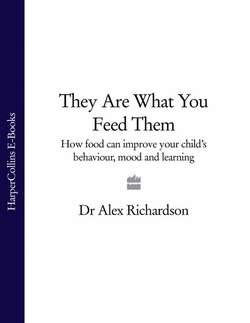Читать книгу They Are What You Feed Them: How Food Can Improve Your Child’s Behaviour, Mood and Learning - Dr Richardson Alex - Страница 13
FAQs
ОглавлениеMy doctor doesn’t believe in food intolerances and pooh-poohs what I say. What should I do?
There are some more enlightened doctors out there who keep up with the research in this field; try to seek one out. To be fair—their workload makes it almost impossible for most doctors and other health professionals to find time to read up on nutrition. What’s more, most of them still receive very little training in this area—and as you’ll see in Chapter 6, the whole area of food allergies and intolerances is a highly complex one that still needs more research. Do tell your doctor about the FAB Research website, though, because many health professionals I know find this a very useful resource, allowing them to see some of the scientific research for themselves. I also don’t think many doctors would take issue with most of the dietary advice you’ll find in this book, but the decision on what to do has to be up to you. If I were you, I’d get a second opinion from a doctor who does listen—but I’d also read up as much as I could, talk to other people and then make my own choices. In any case, I wish you the best of luck.
I’m a teacher and have three main frustrations: because of the crowded syllabus I have so little time to explore the need for good nutrients with my pupils; we have vending machines that sell soft drinks and sweets (the Head says we need them to fund non-teaching staff); since we were forced to put the school dinners out to tender, they have gone from healthy spreads to mainly junk food.
I hear these frustrations a lot. Show this book to your head teacher, other staff and governors. Write to your local MP and the education minister, and join FAB Research and the many other not-for-profit groups who are campaigning for things to change.
